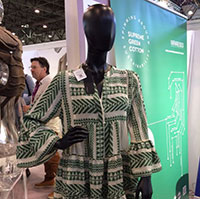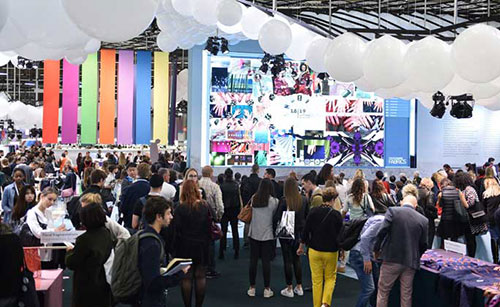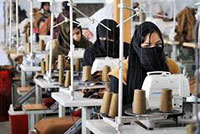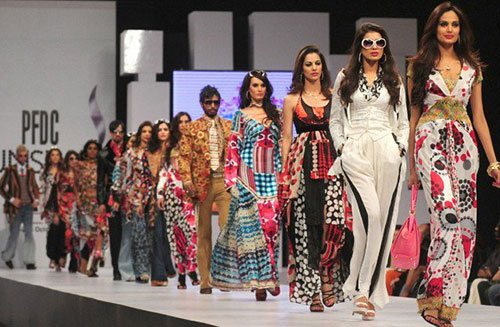FW
Archroma, a global leader in color and specialty chemicals towards sustainable solutions, has joined the ZDHC Foundation as a contributor.
This decision is in line with Archroma’s commitment to continuously challenge the status quo in the deep belief that it is possible to make the textile industry sustainable. Archroma develops innovations and system solutions developed in compliance with this commitment and aims to help textile manufacturers to optimise productivity and/or value creation in their markets.
Archroma is supporting the ZDHC Manufacturing Restricted Substance List (ZDHC MRSL) and the related “pyramid” conformity system designed to eliminate duplicative approaches. This is the fundamental base to the success of ZDHC and all stakeholders of the textile value chain.
Archroma has already uploaded and published a first batch of more than 1020 products on the Chemical Module of the ZDHC Gateway, the online search tool that enables stakeholders in the textile value chain to evaluate the ZDHC MRSL conformance level of chemical formulations used in their production processes. These products are all bluesign® approved and are therefore associated with the highest level of confidence in ZDHC MRSL conformance. More products will be added in the ZDHC Gateway in the weeks and months to come.
"Held from September 17-19, 2019, latest edition of Premiere Vision in Paris showcased innovations for F/W 2020-21. Well-attended by top international buyers and insiders, the show held a number of meetings and networking activities. Focusing on sustainability, the fair displayed several new age materials and products in its Smart Creation area. One of them was Reda Flexo, a new merino wool fabric with an eco-friendly stretch fiber added to it. "
 Held from September 17-19, 2019, latest edition of Premiere Vision in Paris showcased innovations for F/W 2020-21. Well-attended by top international buyers and insiders, the show held a number of meetings and networking activities. Focusing on sustainability, the fair displayed several new age materials and products in its Smart Creation area. One of them was Reda Flexo, a new merino wool fabric with an eco-friendly stretch fiber added to it. Also on display were cotton fabrics produced with Supreme Green Cotton, a variety of OGM free cotton grown by Greek manufacturer and cotton grower Varvaressos, whose cotton fields are irrigated according to a pioneering satellite-powered drip irrigation system using Israeli innovative technologies that customise water pouring and help save up to 40 per cent water.
Held from September 17-19, 2019, latest edition of Premiere Vision in Paris showcased innovations for F/W 2020-21. Well-attended by top international buyers and insiders, the show held a number of meetings and networking activities. Focusing on sustainability, the fair displayed several new age materials and products in its Smart Creation area. One of them was Reda Flexo, a new merino wool fabric with an eco-friendly stretch fiber added to it. Also on display were cotton fabrics produced with Supreme Green Cotton, a variety of OGM free cotton grown by Greek manufacturer and cotton grower Varvaressos, whose cotton fields are irrigated according to a pioneering satellite-powered drip irrigation system using Israeli innovative technologies that customise water pouring and help save up to 40 per cent water.
Tanned leathers and biodegradable fabrics
Innovations by leather manufacturers and tanners included Evolo by Sciarada. This is a new variety of leather which is tanned by reusing raw materials without additional chrome. This reduces the level of water consumption and recycling leather from the tanning process. Other tanners who offered their environmentally friendly leathers included Dani, Chiorino and Raynaud.
which is tanned by reusing raw materials without additional chrome. This reduces the level of water consumption and recycling leather from the tanning process. Other tanners who offered their environmentally friendly leathers included Dani, Chiorino and Raynaud.
Eastman Naia Cellulosic Yarn showcased 100 per cent Naia fabrics that are more biodegradable. The brand also offered new blends with other sustainable fibers such as cellulosic fibers, wool, bamboo and silk, while offering sports mesh entirely made with Naia.
Sportswear and outdoor brands displayed their performance and eco-friendliness fabrics. Prominent among these was Polartec, the polar fleece specialist, which showcased a special material that aims to be more sustainable as it is trying to cover its fleece with two matelassè strata that prevent the microplastic fibers to be released when washed.
Wool and other fabrics for winter
Sensitive Fabrics by Eurojersey offered a wide selection of prints, which though similar to checked and herringbone wools, are doubled with other Sensitive Fabrics on the inner side to enable them to be used for winter jackets and coats also.
Estethia G.B. Conte, a division of Marzotto Group, launched new line technical wools known as Wool+ which can be worn during commuting and other daily activities. . Redaelli Velluti presented its Super Velvet three-layer waterproof fabric and also a selection of Primaloft eco-friendly materials that are worked as fake-furs, are super soft and as beautiful as natural ones.
Schoeller launched it Proearth collection of biodegradable textiles designed for lifestyle, fashion and outdoor categories. These textiles are made with virgin polyester optimised for biodegradation and tested to biodegrade at faster and better rates than competitive offerings. For this fall the offer includes fabrics for jacket, pant and lining material qualities with various color options.
Bio-technical treatments on display
Denim exhibitors displayed innovative bio-technical treatments such as those developed by M Blue including Avocado Finish and Lanolin Finish adding softening properties, and Stay Fresh, adding odor-control properties to garments. Shinjentex presented a special enzyme wash that requires no further garment washing after the treatment. Also new was the selection of denims offered by Hemp Fortex that also uses fibers like hemp, wild silk and yak hair.
Innovations also ruled the products displayed by shirting specialists. Canclini, for instance, offered Canclini 1925, a series of more casual shirting fabrics available in different weights, patterns and weaves, such as checked fabrics for over shirts and leisure time shirts, and in chambray and lightweight indigo denim alternatives.
"The war for the best apparel maker crown is getting hotter with Pakistan joining the race alongside Vietnam, Cambodia, India, Bangladesh. However, as the country aspires to reach the top, it first needs to check the availability of a suitable product category, materials required, labor cost and skill, workers’ rights, compliance, access to ports, manufacturing equipment, tariff structures, distance to end market and most importantly production capacity. The country also has to the face the additional obstacle of government taxation."
 The war for the best apparel maker crown is getting hotter with Pakistan joining the race alongside Vietnam, Cambodia, India, Bangladesh. However, as the country aspires to reach the top, it first needs to check the availability of a suitable product category, materials required, labor cost and skill, workers’ rights, compliance, access to ports, manufacturing equipment, tariff structures, distance to end market and most importantly production capacity. The country also has to the face the additional obstacle of government taxation. To attract government’s attention on this issues, some apparel manufacturers are going on strike and even shutting down temporarily.
The war for the best apparel maker crown is getting hotter with Pakistan joining the race alongside Vietnam, Cambodia, India, Bangladesh. However, as the country aspires to reach the top, it first needs to check the availability of a suitable product category, materials required, labor cost and skill, workers’ rights, compliance, access to ports, manufacturing equipment, tariff structures, distance to end market and most importantly production capacity. The country also has to the face the additional obstacle of government taxation. To attract government’s attention on this issues, some apparel manufacturers are going on strike and even shutting down temporarily.
Lack of government support hinders growth
One such company, Shahkam Industries exporter of hoodies, track pants and polos to brands like American Eagle, Zara, Primark, Pull and Bear, Forever 21 and Urban Outfitters. Operating since 1992, Shahid Bhatt, CEO of the company believes Pakistan is very competitive as it has excellent raw material, readily available yarn and factories which, after the lifting of quotas in 2005 and the cotton crisis of 2009 survived. He says, the main obstacle in their progress is the government’s lack support. Bhatt reveals that Vietnam gets duty free access to the US, whereas Bangladesh has the same situation as Pakistan. Additionally, their industry is preferred by their government and given protection because it forms 80 per cent of their industry. He feels the only reason the Pakistani industry is able to survive is because other places import their fabric/raw material and Pakistan makes on its own.
Eagle, Zara, Primark, Pull and Bear, Forever 21 and Urban Outfitters. Operating since 1992, Shahid Bhatt, CEO of the company believes Pakistan is very competitive as it has excellent raw material, readily available yarn and factories which, after the lifting of quotas in 2005 and the cotton crisis of 2009 survived. He says, the main obstacle in their progress is the government’s lack support. Bhatt reveals that Vietnam gets duty free access to the US, whereas Bangladesh has the same situation as Pakistan. Additionally, their industry is preferred by their government and given protection because it forms 80 per cent of their industry. He feels the only reason the Pakistani industry is able to survive is because other places import their fabric/raw material and Pakistan makes on its own.
Butt also believes the government needs to incentivise downstream value addition. It needs to punish export of raw material (yarn and cotton) and compel value addition of them. If they don’t, exports will remain low – our yarn is sometimes being sold to Bangladesh and other Asian countries and they use it to compete against Pakistan’s apparel, companies.
Increase in sales tax to make things worse
As per Awais Ashraf, Head of Marketing, Interloop, another successful manufacturing company that focuses on hosiery and active wear, the new 17 per cent sales tax is likely to increase prices of the raw material, leading more people to import their raw materials, killing the local industry. Pakistan also needs to focus on vocational training and literacy. Untrained labourers cost margins to exporters as they make mistakes.
The prices of electricity and gas are also increasing, leading to bigger companies like Interloop trying to generate their own power. However, other countries facilitate their industries with electricity and gas. They get uninterrupted supply and industrial zones are created, with duty free benefits.
Pakistan’s infrastructure too isn’t sophisticated enough to compete with larger rivals. Bangladesh is the top contender followed closely by Vietnam and India. Though the country has abundant materials and labour it first needs to tick off other requirements with the support of the government. Overall, the country has huge potential in the apparel sector. However, to reach the top, it needs to first reevaluate its policies.
For the first time, Bluesign is holding consultations with both external and internal stakeholders to update its Bluesign system criteria. The consultation, which has been extended from system partners, to NGOs, trade associations, and various textile industry authorities, has also been extended to September 30, 2019. The latest revision includes language refinements for better understanding, specific changes in content, and the development of new criteria to ensure the Bluesign System is ‘better aligned’ with the textile industry and related areas.
Bluesign regularly revises limits and usage bans for chemical substances that are published in the Bluesign system substances list (BSSL) for consumer safety limits to produce a comprehensive restricted substance list (RSL) for download that brands can use to improve chemical management in their supply chains.
Italian textile company Manteco will showcase its innovative range of textiles at Première Vision’s Smart Creation, the fair’s most cutting edge epicentre that features visionary innovators pushing for a sustainable change and making a difference in the fashion business. Manteco’s latest responsible fashion innovations, selected by the Smart Creation team, will be displayed in the Smart Library, located in the Smart Creation area, Hall 3 of Première Vision, take the chance to touch and feel real responsible innovation!
The Prato-based company showcases a unique range including:
•BiBye®, a heritage superfine wool coming from the best farmers in Australia and NewZealand that give life to a double splittable traceable fabric, with the best performance thanks to its unique construction and processing techniques.
•Woolten®, a Manteco development with proven sustainability credentials, and a fabulous unique touch, made with a patented special carded yarn that blends the Next Generation recycled wool by Manteco and Tencel® by Lenzing.
•Project43® by Manteco, a “zero waste” oriented circular economy system, fully integrated that allows customers to confer their production fabric scraps made with Manteco fabrics, and get back a totally engineered P43 new smart fabric.
Weaves will be held in Tamil Nadu from November 27 to 30, 2019. The textile fair permits weavers to connect with a global audience. The event will focus on promoting powerloom and handlooms. Over 250 exhibitors will showcase their distinct products from different parts of Tamil Nadu. Weaves will highlight processed and finished fabrics, home textiles, textile machinery as well as ethnic, handloom and khadi material, would be of great use to the 90 weaving clusters in the state.
Businesspersons from all over the world will take part in the world’s largest wholesale textile market in south India. Weaves, South India’s first mega textile fair, aims at creating a positive and constructive environment for manufacturers and traders, where they can showcase their products and meet with buyers from India and other countries. Weaves acts as a gateway to the textile industry for weavers and an opportunity to showcase, connect, and collaborate, where innumerable textile talents can showcase their expertise and market their products to customers from all over the globe. Weaves is an attempt to have a global connect for weavers and all kinds of textiles manufacturers and create opportunities through networking, technology, smart marketing and business empowerment.
Kontoor Brands recently refused to accept shipments worth $2.6 million (more than Tk 22 crore) dealing a serious blow to 11 Bangladeshi garment exporters although the shipment reached the port on time. As a result of this, the garment companies will have to bear the freight charges for shipping the goods back and face compensation claim from US retailer Kontoor Brands. Kontoor, however, claims it sent back the goods as the shipment missed the sales season. The goods were shipped from Bangladesh in January this year.
Of the 11 companies, Nassa Apparels lost $998,110. The exporter claimed to have shipped the goods on free on board (FoB) basis. Scott Deitz, Vice President for global corporate relations of Kontoor Brands stated that according to Kontoor’s contract terms, the vendor bears all risk of loss of the goods only until the goods reach the destination terminal and transfer of the title of goods to Kontoor takes place. He claimed that many of the vendors did not have the necessary insurance, while others chose not to protect themselves from the potential risk of loss.
The brand is therefore taking certain steps to assist these affected uninsured vendors who continue to produce goods on the brand’s behalf. This assistance includes paying demurrage fees, costs to loss adjustors to prevent the goods from being abandoned, and return-to-origin transportation fees on behalf of the vendors to limit their further losses. Kontoor is also helping to arrange for the now distressed goods to be sold through other channels to mitigate the losses for these affected vendors.
While China grants duty-free access to cotton yarn from Pakistan and Vietnam, Indian cotton yarn exports to China face a levy. This has adversely impacted Indian cotton yarn exports. Till last year, Indian cotton yarn exports to China constituted around 30 per cent of the country’s exports. In June and July, Indian cotton yarn exports to China successively reduced by more than 80 per cent. Cotton yarn exports to China fell 61 per cent in the April to July period this year from a year ago. In the same period, total cotton yarn exports contracted by 37 per cent.
Cotton yarn sector is a crucial pillar of India’s textile industry. Pakistan’s manufacturers will get bolstered because of free access to such a big market and increase their presence. Pakistan and China have a strategic give-and-take partnership, with the former providing connectivity and the latter giving economic concessions. India has become collateral damage in this process. India which has wanted to reduce its trade deficit with China now has a serious competition in Pakistan.
But it is also true that Indian cotton yarn exports have been hit because global demand has fallen and prices have collapsed.
V Muthukumaran, Global Business Head, Leather Products, Tata International Limited is the new president of the Indian Shoe Federation (ISF).
Established in 1992, ISF has many leading manufacturers and exporters of footwear and footwear components from India as its members. The Federation is committed to promoting the growth of the Indian footwear industry through the adoption of modern, transparent and superior industry practices.
India is the second largest footwear producer in the world with nine per cent of the global annual production. China produces over 60 per cent of the global production. From a basic need-based industry to an indispensable part of the overall fashion market, the Indian footwear industry has come a long way. Cluster development activities in the footwear industry has given a major boost to private capital flow in the organized segment and enhanced the capacity to keep pace with future growth prospects. Athleisure footwear is picking up very fast because of aspirational consumers and the trend is not confined to metros but small cities are generating equal traction. There has been an incremental rise in women’s per capita expenditure. So manufacturers and retailers are increasingly focusing on women’s footwear. Moreover, there is a growing number of women at workplaces and high disposable incomes.
Inditex believes the exit of United Kingdom from the European Union (E) without a deal will not have any significant impact on its operations. It would basically lead to a change in the regulatory environment in which the group operates in the United Kingdom, as well as in the commercial relationship between the United Kingdom and the European Union, as the British market would be governed by the rules of the World Trade Organization (WTO). This would subject the cross-border trade to customs controls and tariffs.
It would also result in potential delays in the transit of the merchandise, economic impacts derived from the imposition of tariffs, currency fluctuation and possible restrictions on the free movement of employees, as well as those derived from contractual or management risks of key third parties.












